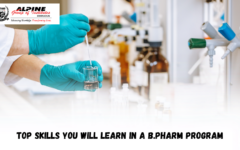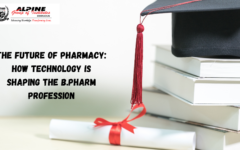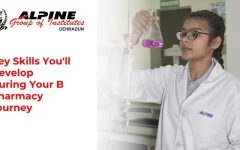B Pharmacy Course: How it Prepares You for the Pharma Industry
2024-12-11 8:08B Pharmacy Course: How it Prepares You for the Pharma Industry
The B Pharmacy course plays a crucial role in preparing students for a successful career in the pharmaceutical industry. This course is designed to provide both theoretical knowledge and practical skills that are essential for working in a highly regulated, fast-paced, and evolving field. Here’s how the B Pharmacy course equips students for the pharmaceutical industry:
1. Comprehensive Understanding of Pharmaceutical Sciences
- Fundamental Knowledge: The B Pharmacy course covers the core principles of pharmacology, pharmaceutical chemistry, pharmacognosy, pharmaceutical biotechnology, and drug formulation. This foundational knowledge is essential for understanding how medications work, how they are developed, and how they affect the human body.
- Students learn about various drug classes, their therapeutic effects, side effects, and how they are utilized to treat specific medical conditions. This knowledge is crucial when working in pharmaceutical companies, as it helps in drug development, patient care, and regulatory processes.
2. Hands-on Experience and Practical Training
- Laboratory Skills: Throughout the course, students undergo extensive laboratory training. They learn how to conduct experiments, perform drug analysis, and understand the chemical processes involved in the development of medications. These hands-on experiences are vital when working in pharmaceutical research and quality control roles.
- Internships and Industry Exposure: Many universities and colleges offering B Pharmacy have tie-ups with pharmaceutical companies for internships and industry visits. This gives students real-world exposure to the practices followed in the pharma industry, including production, quality testing, packaging, and distribution.
- Clinical Training: B Pharmacy programs also often include clinical pharmacy modules, which teach students how to work with healthcare providers and patients. This is crucial for pharmacists working in hospitals, clinics, or as community pharmacists, ensuring they understand drug interactions, patient safety, and proper drug administration.
3. Knowledge of Drug Manufacturing and Regulatory Guidelines
- Drug Manufacturing Processes: Students are trained in the processes involved in drug formulation, including how raw materials are transformed into finished pharmaceutical products. This knowledge is essential when working in manufacturing plants or companies involved in the production of drugs.
- Regulatory Affairs: A key component of the B Pharmacy course is understanding the regulatory guidelines and legal aspects of the pharmaceutical industry. Students learn about drug approval processes, Good Manufacturing Practices (GMP), Good Laboratory Practices (GLP), and international standards like those from the FDA (Food and Drug Administration), EMA (European Medicines Agency), and WHO (World Health Organization).
- Pharmacovigilance: The course also emphasizes the importance of drug safety monitoring, where students learn how to assess the safety of drugs in the post-marketing phase, and report adverse drug reactions (ADRs) and side effects.
4. Pharmaceutical Marketing and Sales Knowledge
- B Pharmacy graduates are also trained in pharmaceutical marketing and sales. This includes learning about the marketing strategies for drugs, how to promote pharmaceutical products, and understanding the legal and ethical standards in pharmaceutical sales.
- As many pharmaceutical companies focus on the promotion and sales of their products, a strong understanding of marketing and sales can be beneficial for those pursuing careers in this field.
5. Research and Development Skills
- The B Pharmacy course introduces students to pharmaceutical research, which is a key aspect of the pharmaceutical industry. Students learn about the drug discovery process, preclinical trials, and clinical trials. They are also exposed to biotechnology and genetic engineering techniques that are shaping the future of medicine.
- By gaining insights into formulation science, bioavailability, and nanotechnology, students are better prepared to contribute to innovative drug development and personalized medicine in the pharmaceutical industry.
6. Critical Thinking and Problem-Solving Abilities
- The B Pharmacy course encourages students to develop strong analytical and problem-solving skills. In the pharmaceutical industry, professionals must analyze complex data, such as drug efficacy, safety profiles, and patient needs.
- Students are trained to critically assess the scientific literature, evaluate the effectiveness of drugs, and contribute to the continuous improvement of pharmaceutical products and processes.
7. Communication and Collaboration Skills
- Effective communication is essential in the pharmaceutical industry. B Pharmacy students are trained to communicate scientific information clearly, whether it’s writing research reports, discussing drug formulations with team members, or advising patients on medication use.
- The course also promotes teamwork and collaboration, as many aspects of pharmaceutical work, such as clinical trials or R&D projects, require cooperation across different departments and professional disciplines.
8. Ethical and Legal Training
- The B Pharmacy course includes training on the ethical and legal responsibilities of a pharmacist or pharmaceutical professional. Students are taught about pharmacy law, patient confidentiality, ethical drug distribution, and clinical ethics.
- This prepares students to make decisions that prioritize patient safety, legal compliance, and ethical considerations when working with drugs and healthcare providers.
9. Exposure to Global Pharma Trends
- With global pharmaceutical companies working across different countries, students in B Pharmacy programs are often introduced to international trends and practices. They learn about the global drug market, patent laws, biopharmaceutical innovations, and the importance of global health initiatives.
- This global perspective makes B Pharmacy graduates more adaptable to working in international pharmaceutical companies or handling drugs intended for international markets.
10. Opportunities for Further Specialization
After completing a B Pharmacy degree, graduates have the opportunity to pursue further specialization in fields such as M Pharmacy, PhD in Pharmaceutical Sciences, or clinical research. These advanced qualifications can deepen their expertise and open doors to leadership positions in the pharmaceutical industry, such as R&D heads, regulatory affairs managers, or drug safety specialists.
Conclusion
The B Pharmacy course provides a solid foundation for students aspiring to work in the pharmaceutical industry. From understanding drug development and manufacturing processes to learning about regulatory affairs, clinical pharmacy, and ethical considerations, the course ensures that students are well-prepared for various roles in the sector. By combining theoretical knowledge with practical training and industry exposure, the B Pharmacy course equips students with the essential skills and competencies needed to thrive in the dynamic and ever-evolving pharmaceutical industry.







